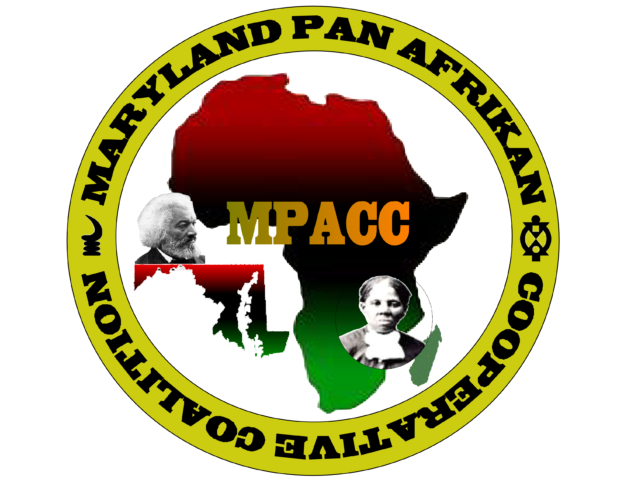Building the Maryland Pan Afrikan Cooperative Coalition in Maryland
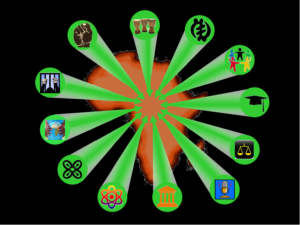 The Maryland Pan Afrikan Cooperative Coalition is building right now. The work is far from complete. We have been meeting on Zoom on a monthly basis since January 2022, getting to know each other and proposing ideas for projects and agreements that we all can embrace together, including support for Black Media, developing and coordinating grassroots-led community-education initiatives, proposing agreements for mutual and community protection and planning community Town Hall-style events when concerns about the COVID Pandemic have lessened. The organizations listed below and others are part of that Coalition, but there are many other organizations that are not yet part of it, and their involvement and input are most welcome and needed if we are to achieve truth, justice and righteousness in our society. In short, we are building this Coalition, but we have a long way to go before we accomplish that which we seek.
The Maryland Pan Afrikan Cooperative Coalition is building right now. The work is far from complete. We have been meeting on Zoom on a monthly basis since January 2022, getting to know each other and proposing ideas for projects and agreements that we all can embrace together, including support for Black Media, developing and coordinating grassroots-led community-education initiatives, proposing agreements for mutual and community protection and planning community Town Hall-style events when concerns about the COVID Pandemic have lessened. The organizations listed below and others are part of that Coalition, but there are many other organizations that are not yet part of it, and their involvement and input are most welcome and needed if we are to achieve truth, justice and righteousness in our society. In short, we are building this Coalition, but we have a long way to go before we accomplish that which we seek.
While MPACC is based in the state of Maryland in the United States, we welcome Pan Afrikan organizations and activists from outside the state of Maryland. Some of our participants and guests have hailed from Washington DC, Philadelphia PA, Atlanta GA, New York City NY, Chicago IL, South Carolina, Florida, Panama and the Caribbean, for example. Our ultimate goal will be to not only develop an effective Cooperative Coalition in Maryland, but to also inspire the building of similar Cooperative Coalition efforts in other locations across the United States and around the entire Afrikan Diaspora, ultimately building that global Pan Afrikan Unity we all know we need.
The following are examples of Pan-Afrikan organizations in Maryland and the Afrikan Diaspora who embody different aspects of community organizing and have attended at least one meeting. Some of these organizations regularly meet with us, some have met with us occasionally, while others who we know and who we may not know are cordially invited to join with (not under) us.
Official MPACC Organizational Partners
Over the course of our monthly Zoom meetings since January 2022, participants have come, gone, and in some cases later returned. This has been the process through which we have begun to establish a core group of committed Organizational Partners. We are now in the process of determining which organizations and activists are willing to officially become members of the Cooperative Coalition. Organizers and activists have now announced their solidarity with us in the specific areas of Culture, Spiritual Development, Grassroots Organizing, Media, Business and Revolutionary Pan-Afrikanism. The diagram below provides a “snap-shot” of the current committed organizational members, with several individuals having also expressed their interest in the Cooperative Coalition in the areas of Political Organizing, Legal, Education and Science, Health & Wellness (shown in red as there is no established Organizational Partner as of yet in those areas) as we continue to move forward.
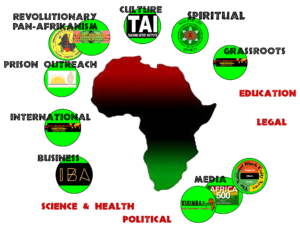
The following organizations have agreed to officially participate in the Maryland Pan Afrikan Cooperative Coalition:
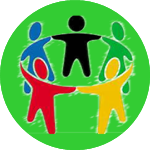
Grassroots Civil Society Organizing
Sixth Region Diaspora Caucus (SRDC)
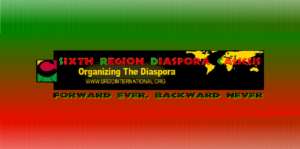 “The Sixth Region Diaspora Caucus (SRDC) was founded in 2006 in response to an invitation from the African Union (AU) to the African Diaspora (people of African descent around the world) to become involved in the AU’s work toward uniting and lifting African people in the Continent and throughout the world.”
“The Sixth Region Diaspora Caucus (SRDC) was founded in 2006 in response to an invitation from the African Union (AU) to the African Diaspora (people of African descent around the world) to become involved in the AU’s work toward uniting and lifting African people in the Continent and throughout the world.”
SRDC pursues the organization of the Pan-Afrikan Diaspora, those whose Ancestors were kidnapped from Afrika centuries ago and subjected to slavery and servitude as well as those who were born in Afrika and since emigrated around the world, by demonstrating the connections that still exist between us and the efforts of our historic enemies to keep us apart. This is done through a process of local Pan Afrikan Town Hall Meetings, national conferences of those who are working to accomplish this mission, and international summits to unify and galvanize organizations and activists around the world to unify and amplify our collective voice at international bodies such as the African Union and United Nations. Contact SRDC by email at info@srdcinternational.org or cliff@kuumbareport.com.
Maryland Council of Elders (MCOE)
 “Our Elders and Social Media community knows that strength lies not only in the words we stand by, but most importantly through the actions of our united collective. Our founding leaders realized that by working together we could overcome challenges much more efficiently, and that is why we ultimately decided to join forces as the Maryland Council of Elders.”
“Our Elders and Social Media community knows that strength lies not only in the words we stand by, but most importantly through the actions of our united collective. Our founding leaders realized that by working together we could overcome challenges much more efficiently, and that is why we ultimately decided to join forces as the Maryland Council of Elders.”
Among MCOE’s recent accomplishments are several Town Hall Meetings in Baltimore City to discuss issues such as Cop City Baltimore, the Police-Military-Prison-Intelligence Industrial Complex and Establishing a “Zone of Peace” in the Americas and elsewhere in the world; and organizing Baltimore-area commemorations of African Liberation Day (ALD) from 2019 to the present day. Contact them by email at marylandcouncilofeldersbmore@gmail.com.

Pan-Afrikan Media
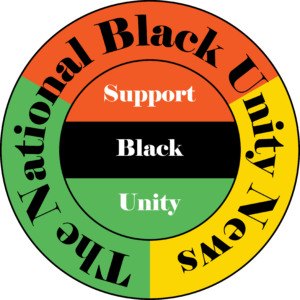 “DOING BUSINESS ON OUR OWN TERMS. The National Black Unity News is the newest and fastest growing periodical in the Nation catered and focused to the Black Community.
“DOING BUSINESS ON OUR OWN TERMS. The National Black Unity News is the newest and fastest growing periodical in the Nation catered and focused to the Black Community.
“This is an electrifying time for TNBUN as we continue to Support Black Unity by expanding across the entire United States. This vision was set by Mr. David Murphy, Publisher/President and Bill Goodin, Editor in Chief of TNBUN. The entire staff has dedicated many hours to developing a platform with the goal of opening the communication network so that we can assist in building institutions of organizations, education, economic empowerment, entertainment, and media services to connect our community.
“We were extremely pleased to introduce The National Black Unity News to the United States in March 2017. We have continued to provide local black businesses and organizations with powerful solutions to connect with their customers and grow their business through Articles, advertising, sales/marketing and solution-oriented information.”
Contact TNUBN by emailing the Founder and Publisher, Baba David Murphy, at thenationalblackunitynews@gmail.com.
Africa 500 Radio
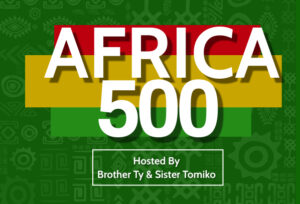 Africa 500 Radio was founded by Sis. Tomiko and Bro. Ty to report, discuss and analyze current events from the perspective of the descendants of enslaved Afrikans in the Diaspora and the Mother Continent. Originally named Africa 400, the name was updated to Africa 500 to better reflect the more than 500 years of the Global Pan-Afrikan Struggle against the Ma’afa, the Great Disaster, the enslavement of our Ancestors in Arabia, the Americas and our own Ancestral Home. The program has been broadcast on traditional radio as well as Internet radio since the year 2020. As new episodes are produced and broadcast, they are made available to the public on the Web sites https://kuumbareport.com, https://kuumbaevents.com and https://srdcinternational.org. They can be reached by email at AFRICA400radio@gmail.com.
Africa 500 Radio was founded by Sis. Tomiko and Bro. Ty to report, discuss and analyze current events from the perspective of the descendants of enslaved Afrikans in the Diaspora and the Mother Continent. Originally named Africa 400, the name was updated to Africa 500 to better reflect the more than 500 years of the Global Pan-Afrikan Struggle against the Ma’afa, the Great Disaster, the enslavement of our Ancestors in Arabia, the Americas and our own Ancestral Home. The program has been broadcast on traditional radio as well as Internet radio since the year 2020. As new episodes are produced and broadcast, they are made available to the public on the Web sites https://kuumbareport.com, https://kuumbaevents.com and https://srdcinternational.org. They can be reached by email at AFRICA400radio@gmail.com.
 This is the Official Web Site of the KUUMBAReport Newsletter. In publication from 1997 to 2008, this activist-oriented, Afrikan-centered newsletter was dedicated to tackling current issues and presenting them in a way to make the reader consider what they may think they know about key events. When events happened, we found information that we felt has been either hidden or poorly presented to the masses of the people. That commitment continues with the Web site, We strive to offer the reader a “different viewpoint” based on ancient Afrikan principles of Ma’at (truth, justice, righteousness, harmony, reciprocity, balance, compassion, order and propriety) and a primarily Pan-Afrikanist viewpoint. Issues we have covered in detail include police brutality, political prisoners, economic vehicles, Afrikan-centered education, the death penalty, Indigenous peoples’ issues, and war. We strive to give a balanced picture of what is happening, recognizing the humanity of all participants, even those we criticize. We are also not averse to criticizing our own community and ourselves when it is necessary. For more information, email cliff@kuumbareport.com or continue to peruse our Web site, https://kuumbareport.com.
This is the Official Web Site of the KUUMBAReport Newsletter. In publication from 1997 to 2008, this activist-oriented, Afrikan-centered newsletter was dedicated to tackling current issues and presenting them in a way to make the reader consider what they may think they know about key events. When events happened, we found information that we felt has been either hidden or poorly presented to the masses of the people. That commitment continues with the Web site, We strive to offer the reader a “different viewpoint” based on ancient Afrikan principles of Ma’at (truth, justice, righteousness, harmony, reciprocity, balance, compassion, order and propriety) and a primarily Pan-Afrikanist viewpoint. Issues we have covered in detail include police brutality, political prisoners, economic vehicles, Afrikan-centered education, the death penalty, Indigenous peoples’ issues, and war. We strive to give a balanced picture of what is happening, recognizing the humanity of all participants, even those we criticize. We are also not averse to criticizing our own community and ourselves when it is necessary. For more information, email cliff@kuumbareport.com or continue to peruse our Web site, https://kuumbareport.com.
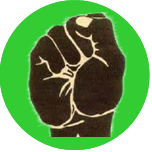
Revolutionary Organizing
Organization of All Afrikan Unity (OAAU-BPC)
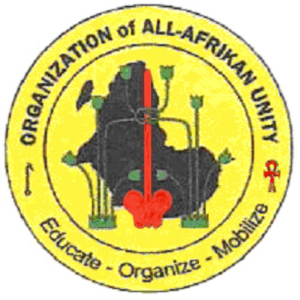 The Organization of All Afrikan Unity Black Panther Cadre (OAAU-BPC) was founded by onetime Black Panther Baba Ade Oba Tokunbo in Baltimore City. We became familiar with OAAU-BPC in 1995, and were introduced to issues of political prisoners, police brutality and global Pan-Afrikanism as a result of our association with this important local organization. OAAU-BPC’s mission is to educate, organize and mobilize Afrikan People by making presentations at Town Hall Meetings that are scheduled by OAAU-BPC and allied Pan-Afrikan activists. Central to the organizing of our people is the development of cooperatives as described in The Akoben Plan, a call to action around the building of economic and political cooperative efforts and the building of real, practical Pan Afrikan Unity. To learn more about OAAU-BPC or to become involved with the organization, email cliff@kuumbareport.com.
The Organization of All Afrikan Unity Black Panther Cadre (OAAU-BPC) was founded by onetime Black Panther Baba Ade Oba Tokunbo in Baltimore City. We became familiar with OAAU-BPC in 1995, and were introduced to issues of political prisoners, police brutality and global Pan-Afrikanism as a result of our association with this important local organization. OAAU-BPC’s mission is to educate, organize and mobilize Afrikan People by making presentations at Town Hall Meetings that are scheduled by OAAU-BPC and allied Pan-Afrikan activists. Central to the organizing of our people is the development of cooperatives as described in The Akoben Plan, a call to action around the building of economic and political cooperative efforts and the building of real, practical Pan Afrikan Unity. To learn more about OAAU-BPC or to become involved with the organization, email cliff@kuumbareport.com.
Maryland Council of Elders (MCOE)
 See above (Grassroots Organizing) for the full discussion of the Maryland Council of Elders and links to their Facebook Page and email address.
See above (Grassroots Organizing) for the full discussion of the Maryland Council of Elders and links to their Facebook Page and email address.
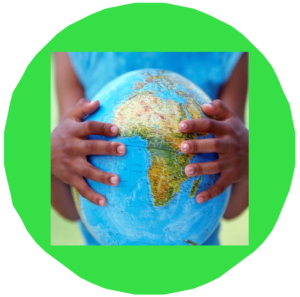
International Pan-Afrikanism
Sixth Region Diaspora Caucus (SRDC)
See above (Grassroots Organizing) for the full discussion of the Sixth Region Diaspora Caucus and links to their Web site and email address.
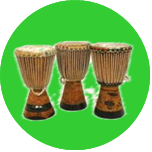
Arts and Culture
Teaching Artist Institute (TAI)
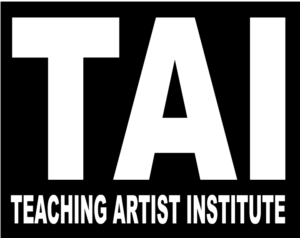 “In August 2014 Soul-Fusion teaching artist Kim Poole arrived in Nigeria with a mission to empower women to celebrate their resilience and encourage cross-cultural communication & peacebuilding through the Music for Change concert series. From this launch pad the Teaching Artist Institute was birthed and the Mission Music workshop series was its first brain child. The Mission Music workshop series uses art to engage artists and artisans in an evidence based curriculum that teaches the importance of using creative expression as a tool for social transformation. Teaching fellow artists and artisans the core tenants teaching artistry in order to understand our global cultural and artistic economy, as well as a method for including an element of creative social responsibility into all forms of knowing is the ultimate goal of the Teaching Artist Institute.
“In August 2014 Soul-Fusion teaching artist Kim Poole arrived in Nigeria with a mission to empower women to celebrate their resilience and encourage cross-cultural communication & peacebuilding through the Music for Change concert series. From this launch pad the Teaching Artist Institute was birthed and the Mission Music workshop series was its first brain child. The Mission Music workshop series uses art to engage artists and artisans in an evidence based curriculum that teaches the importance of using creative expression as a tool for social transformation. Teaching fellow artists and artisans the core tenants teaching artistry in order to understand our global cultural and artistic economy, as well as a method for including an element of creative social responsibility into all forms of knowing is the ultimate goal of the Teaching Artist Institute.
“Mission Statement: The Teaching Artist Institute provides an opportunity for artists to learn techniques for social transformation through artistic expression.
“Goals:
– Train artists and artisans as educators of socially engaged art
– Establish and maintain a teaching artist collective
– Advocate cross cultural communication and mutual understanding thru art
– Create a platform for teaching artist expression
“What is a Teaching Artist? A Teaching Artist is one that recognizes and understands the influential nature of their art and uses it to promote a value system or subject matter as an entity in and of itself or as tool integrated into another discipline.”
Contact Teaching Artist Institute through their Web Site (https://taitours.org/) or their Facebook Page (https://www.facebook.com/teachingartist/).
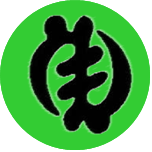
Spirituality
Souls of Life Society
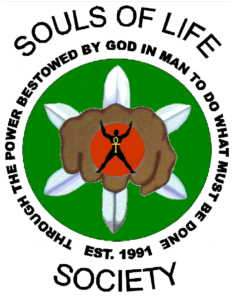 “Feed your spirit and the flesh will follow. When spirit is not fed, the flesh is then led to swallow all that is hollow to your soul. … Acknowledging and embracing the Divine purpose of Humanity to be the continuation of Creation … through Attaining Mastery of Living Awareness.”
“Feed your spirit and the flesh will follow. When spirit is not fed, the flesh is then led to swallow all that is hollow to your soul. … Acknowledging and embracing the Divine purpose of Humanity to be the continuation of Creation … through Attaining Mastery of Living Awareness.”
Baba King Obadele is the Founder, Vessel and CEO of the Souls of Life Society. This is a spiritually-based organization that seeks to educate people in the ways of increased personal, mental and spiritual health. You can contact Souls of Life Society through Baba King’s Facebook Page, https://www.facebook.com/king.teasdell.

Pan Afrikan Business
Indigenous Business Association (IBA)
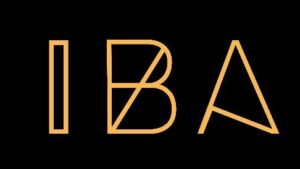 “The IBA Co-op combines the efforts of its memberships to resource the Community Building Initiative.”
“The IBA Co-op combines the efforts of its memberships to resource the Community Building Initiative.”
https://www.facebook.com/IndigenousBusinessAssociation
*********************************************
Several other organizations and activists have met and spoken with us, either in our monthly Zoom meetings or at various organizational meetings. We invite them as well as others to discuss with us further the benefits to individual organizations and the community as a whole when we come together in a true Cooperative Coalition.
Grassroots Civil Society Organizing:
BlackMen Unifying BlackMen (BMUBM)
Political Organizing & Lobbying:
Ujima Peoples Progress Party (UPP)
Revolutionary Organizing:
Pan African Liberation Movement (PLM)
International Pan-Afrikanism:
Pan African Federalist Movement (PAFM)
International Pan-Afrikanism:
Alianza Rastafari De Panama
Rastafari Alliance of Panama
For more information on the Maryland Pan Afrikan Cooperative Coalition and how you or your organization can become involved, please look for updates in this space or write an email to cliff@kuumbareport.com.
A Road to Pan-Afrikan Unity
By Bro. Cliff
Editor, KUUMBAReport Online
cliff@kuumbareport.com
I’ve been reading a lot of emails and other communication that, thankfully, have started to move away from personal arguments to what I believe is a principled discussion of the ideas we all have for organizing Afrikan people in the Afrikan Diaspora as well as in the Mother Continent. While I agree with many of us that immediate concerns such as jobs and wealth are important, they will be nothing but band-aids for a sucking chest wound unless we put together a real organizing model from top to bottom that will work to bring the Pan-Afrikan World to total freedom. I’d like to share with you one piece of such a model, as well as a few thoughts on how it could work as part of a much larger and more comprehensive plan, based on what I believe is (or at least should be) a familiar conceptual model for organizing the Afrikan Diaspora and Afrikans in the Continent.
I want to start by telling you about an organization known as the Sixth Region Diaspora Caucus (SRDC, https://srdcinternational.org). It is primarily based in the United States, but in realizing that the Afrikan-American population comprises only about 40 million of a total of 500-million-to-one-billion Afrikan Descendants around the world living outside the Mother Continent, SRDC has dedicated itself to the organization and uplift of the entire Afrikan Diaspora, and to the need for the Afrikan Diaspora itself to control its own method of organization and uplift.
SRDC: One Major Plan for Organizing the Afrikan Diaspora
Since the African Union (AU) added Article 3[q] to its Constitutive Act in 2003, which invited the Afrikan Diaspora to participate “in the development of the African Continent and the building of the African Union”, the effort on the part of the Afrikan Diaspora to respond to that invitation has been pursued. In April 2006, a Pan-Afrikan Roundtable was held in Los Angeles, California, at which the AU’s definition of the Afrikan Diaspora as “people of African descent and heritage, living outside the Continent, regardless of their country of citizenship, who are willing to assist in the development of the African Continent and the building of the African Union” was accepted (though it was acknowledged at that time to be in need of review in the future) and the effort to organize the Afrikan Diaspora began in earnest.
The first objective of the Afrikan Diaspora, according to the African Union’s “roadmap” for our incorporation in the AU, is representation in the AU’s Economic, Social and Cultural Council (ECOSOCC), a council of Representatives from civil society organizations, activists, the general public, the “people on the ground” as one might say. The AU’s requirement is that the Afrikan Diaspora develop “modalities for election of Representatives” to ECOSOCC (as stated in the Statutes of the Economic, Social and Cultural Council, available on the AU’s website). In other words, Representatives to ECOSOCC cannot be anointed, appointed or self-proclaimed. They must have been elected by their people, and the Afrikan Diaspora must develop a means to accomplish this and submit that method to the AU for their review and approval. Because the Afrikan Diaspora currently has only been designated to receive 20 seats out of the 150 total in ECOSOCC, that means that we have to make those 20 seats count by finding serious, quality Representatives in our communities around the world while adhering to the standard that they must be elected positions. But how do we do that?
SRDC, in partnership with a number of other Pan-Afrikan organizations in the US, Canada, Central America, the Caribbean, South America, Canada, Afrika and Europe, has developed a plan in which we begin by organizing our communities at the local level. In the US, that means state-by-state, while in other parts of the Afrikan Diaspora, this may mean organizing province-by-province (as in Canada), island-by-island (say, in the Caribbean) or country-by-country.
Each local organization determines a local Facilitator, a Community Council of Elders and two (2) Elected Representatives; that is, they are elected through a process in which the community in that local area is invited to several public forums where they learn about the effort, develop their own set of needs and ideas (a “Pan-Afrikan Agenda”), and nominate and elect people from their own community to take the needs as well as the ideas of that community to the national, and even to the international level. The Council of Elders is needed to provide their guidance and wisdom, and to make sure that those who are nominated to be Representatives are indeed qualified, serious activists, thinkers and workers and not opportunists or manipulators as happens too often when our collective guard is down.
Once a reasonable number of local organizations are formed in a large country (like the US) or a sub-region (several smaller countries in a common area), a National or Sub-Regional Summit is held to allow local organizations to share information, develop a more consistent organizing strategy and determine who the best Representatives from that sub-region, from among the local Representatives who were elected by their own communities, will be. Those national and sub-regional Representatives would then meet in a Full Diaspora Summit which would lead to a group of Representatives who take the combined Pan-Afrikan Agenda (the needs, issues and constructive ideas of all the communities in the Afrikan Diaspora) to the African Union in this case, but this model could also be used to develop Representative Councils outside the AU if need be.
SRDC is currently in the process of building this model and putting it into practice in the US, while affiliated organizations are doing similar work in Canada, Central America, South America and Europe. AU member nations are also pursuing a process whereby similar Representative assemblies are being developed in the Continent. SRDC’s method for organizing the Afrikan Diaspora has been submitted to the AU since 2007, and the AU’s official assessment of the proposed method has yet to be made; we continue to press the AU to make the promised assessment and help us determine how we can move that process forward according to the AU’s own plan and objectives. In the meantime, though, SRDC realizes that it cannot wait on the bureaucratic process to unfold before implementing this method. If necessary, adjustments to that method will be made, but in the meantime, the work to organize the Diaspora must move forward. As of this writing SRDC has held fourteen (14) International Summits since the fall of 2007, which have included contingents from several US states, and affiliates from Canada, Central America, Europe, the Caribbean and other Pan-Afrikan organizations. SRDC’s work continues apace, and they invite you to come and work this model with them. Contact SRDC by emailing info@srdcinternational.org or cliff@kuumbareport.com if you want to connect with an SRDC organization where you are, or if you want to create one if there isn’t one where you live.
A Part of The Bigger Picture
This portion of the discussion is based entirely on my personal opinions as a Pan-Afrikan activist, and does not necessarily represent the positions of the Sixth Region Diaspora Caucus or the Pan African Diaspora Union (PADU, an international coalition of a variety of Pan-Afrikan groups).
The work of creating a Representative-based method and strategy for organizing the Afrikan Diaspora is only a part of the whole picture we all must paint together. There are clearly other means and avenues we must pursue if Afrikan people are to fully realize the freedom, self-determination, justice and prosperity we all need and deserve. Businesspeople who have an Afrikan-centered worldview are needed to help us pursue economic development, but not simply Western European development in blackface; rather, it must be culturally and spiritually relevant to Afrikan people, and must be pursued in a way that will not oppress and exploit us or defile the environment of the Continent and planet which we all call home. We also need our Spiritual Community, which must include the Christian, Muslim and Hebrew elements but also ancient Afrikan spiritual traditions such as the Yoruba, the Akan, the Vodou, the Santeria, the MDW NTR and others, to find a way to come together in a true Spiritual Alliance. We need our Cultural and Artists Community to help keep us inspired creatively and to remind us of what and who we are working, building and fighting for. Our revolutionary and direct-action groups in the Diaspora and in the Continent that are all fighting for the people must find a way to work cooperatively if we are to reach our full potential for Pan-Afrikan Unity. We need Legal Warriors who are ready to defend us, our activists and our interests in domestic and international courts. Our scientists, doctors, agriculturalists, engineers, economists and teachers must work together more effectively so that we will have and develop the knowledge base we will need to chart our course of independence from the West as well as the East. We need our Elders, our Women and our Youth, as well as greater strength of will and strength of morality among our Men. We need a strong Pan-Afrikan Media to ensure that our people are properly informed about what is happening in the world around us. And we need a strong moral center to help guide it all from an ethical standpoint; I personally think the Ancient Afrikan moral system of Ma’at would be perfect there.
There are so many different areas in which the work needs to be done, but they must all find a way to work cooperatively toward the total goal of Afrikan Unity, Afrikan Self-Determination, Afrikan Prosperity, Afrikan Morality and Afrikan Justice. While some may see the missions of the different organizations as a series of roads that cross each other (and thus lead to a spirit of rivalry and competition, since everyone wants their “traffic light” to be green always), I prefer to see our various organizations as 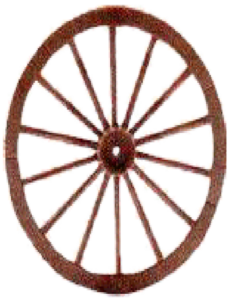 occupying spots on the rim of a large circle, with the objective of a free, prosperous and just Afrika in the center of that circle and their missions as lines that extend from the rim of the circle to the center. The conceptual image thus generated is that of a spoked wheel. A spoked wheel is strong only when all the spokes are strong, the wheel is straight and even, and it can roll smoothly, allowing us to ride it to victory. But when spokes are cut, that wheel bends and is unable to roll smoothly, and ultimately will break down and collapse. The result is what we have been getting: we crash on the side of the Road to History while other committed efforts that have not allowed themselves to be disrupted (politically conservative groups, socialist/communist organizations, LGBTQ advocates, women’s groups, Latino organizations, Asian organizations and White Male organizations) pass us by.
occupying spots on the rim of a large circle, with the objective of a free, prosperous and just Afrika in the center of that circle and their missions as lines that extend from the rim of the circle to the center. The conceptual image thus generated is that of a spoked wheel. A spoked wheel is strong only when all the spokes are strong, the wheel is straight and even, and it can roll smoothly, allowing us to ride it to victory. But when spokes are cut, that wheel bends and is unable to roll smoothly, and ultimately will break down and collapse. The result is what we have been getting: we crash on the side of the Road to History while other committed efforts that have not allowed themselves to be disrupted (politically conservative groups, socialist/communist organizations, LGBTQ advocates, women’s groups, Latino organizations, Asian organizations and White Male organizations) pass us by.
It’s long past time for Afrikan People to work together in a more cooperative and effective way. In 2009, a “Super-Coalition” was proposed on the international level that pursued a vision of Pan-Afrikan Cooperation based on the principle of “Unity Without Uniformity”. It was called the Pan Afrikan Diaspora Union (PADU). PADU is currently inactive, but efforts to move its laudable objective of building true, cooperative Pan-Afrikan Unity forward are continuing. In Maryland, where I live in the United States, we are working to build the Maryland Pan Afrikan Cooperative Coalition, based on the conviction that we must learn to truly work cooperatively before announcing anything as grandiose as a Pan-Afrikan United Front. (Ancestor Amilcar Cabral had warned us all to “tell no lies … claim no easy victories.”) And there certainly are, or will be, other honest efforts by principled activists to build cooperative coalitions among our organizations. If you want to find out more about PADU and the Maryland Pan Afrikan Cooperative Coalition, feel free to contact me by email at cliff@kuumbareport.com and I can tell you more about them and how to contact them officially.
The mindset we have too often insisted upon following until now, that of rivalry and competition, has been the equivalent of taking a saw to the spokes of that Wheel of Pan-Afrikan Unity. This is a large part of why our organizing efforts have failed so many times, and that mindset has frankly got to stop.
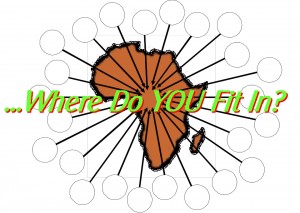 Why do we seem to gravitate toward the politics of competition and rivalry instead of the politics of teamwork, mutual respect and Ujima? Why have we apparently insisted upon following such a failed concept for so long? I chalk it up to a Western-influenced mindset, an I-Have-The-Answer, My-Way-Or-The-Highway philosophy that is based largely on individual and organizational ego. We have to move away from ego (Some people say “EGO” stands for “Edging God Out”) and toward coalition-building and the realization that none of us has all the answers. We also tend to hold on to personal beefs and arguments, based on something that someone did or said in the past, that quite frankly are small compared to what our true enemy has done and continues to do to us. We have to learn to atone for those misdeeds we have done to others and to forgive others for those things they have done to us that we didn’t appreciate.
Why do we seem to gravitate toward the politics of competition and rivalry instead of the politics of teamwork, mutual respect and Ujima? Why have we apparently insisted upon following such a failed concept for so long? I chalk it up to a Western-influenced mindset, an I-Have-The-Answer, My-Way-Or-The-Highway philosophy that is based largely on individual and organizational ego. We have to move away from ego (Some people say “EGO” stands for “Edging God Out”) and toward coalition-building and the realization that none of us has all the answers. We also tend to hold on to personal beefs and arguments, based on something that someone did or said in the past, that quite frankly are small compared to what our true enemy has done and continues to do to us. We have to learn to atone for those misdeeds we have done to others and to forgive others for those things they have done to us that we didn’t appreciate.
We need to finally decide that truly coming together in a spirit of Pan-Afrikan Unity is something we really want to do. Every time 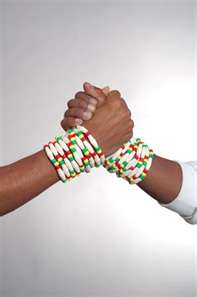 we fail to answer that call is another way in which we disrespect our Ancestors and Elders, we leave our struggling Brothers and Sisters in deprivation and danger, and we betray our children and those unborn. Let’s start, today, to chart that course toward Pan-Afrikan Unity, Prosperity, Freedom, Truth, Justice and Righteousness.
we fail to answer that call is another way in which we disrespect our Ancestors and Elders, we leave our struggling Brothers and Sisters in deprivation and danger, and we betray our children and those unborn. Let’s start, today, to chart that course toward Pan-Afrikan Unity, Prosperity, Freedom, Truth, Justice and Righteousness.
Peace and Power,
Bro. Cliff
Editor, KUUMBAReport Online
https://kuumbareport.com
cliff@kuumbareport.com

